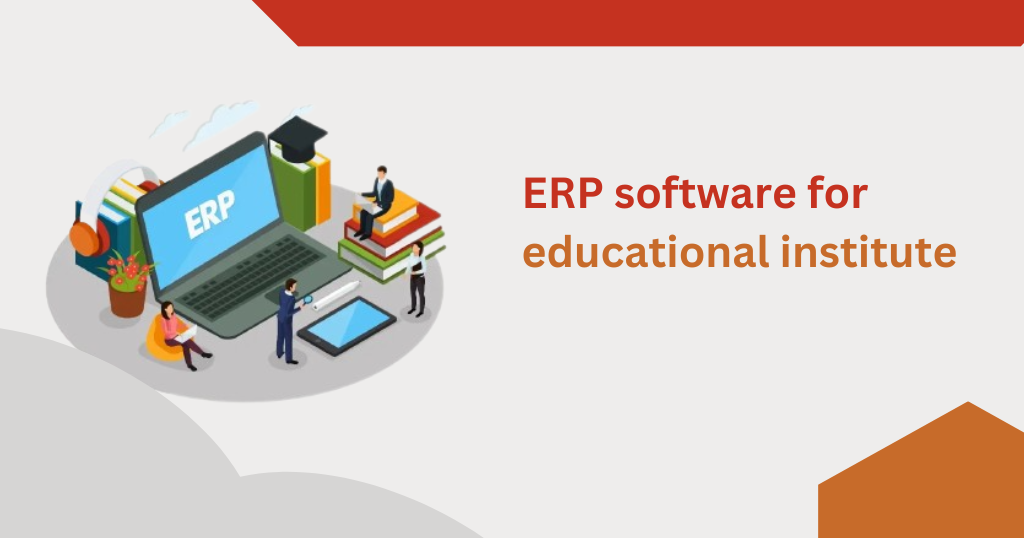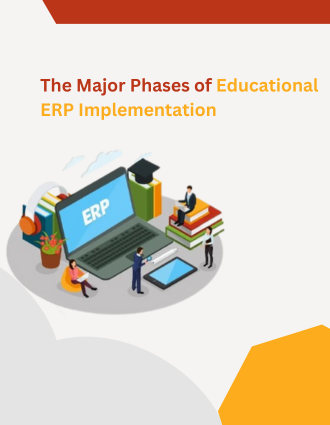Managing an institute management system can be a daunting task as it involves handling various administrative processes, such as admission, examination, and human resource management. The complexity of these processes can make it challenging for educational institutions to manage them effectively and efficiently.
But, if educational institutions use a well-designed student management system and follow the recommended methods, they can make these processes easier and improve their productivity. Today we will take a closer look at the major phases of educational ERP system implementation and their benefits. Let’s dig deep!
What is Educational ERP Software?
Enterprise resource planning (ERP) refers to a system of integrated apps that manage core business processes. A centralized system that gives a single view of an organization’s operations is used to enhance decision-making and boost productivity.

Advanced ERP systems use AI and machine learning to analyze data in real-time and automate all areas of a business. In contrast, educational ERP software is specifically designed for educational institutions such as schools, colleges, and universities. This software simplifies administrative processes, reducing errors and ensuring smooth operations.
An ERP system can manage one school, a group of schools, or an entire university using one solution. With educational ERP software, institutions can improve efficiency, reduce costs, increase productivity, and enhance the overall experience of students and staff.
Educational ERP software helps schools and universities to do their work more easily and with fewer mistakes. This means that staff can spend more time on important things. Overall, it’s a very important tool that helps schools and universities manage their work better, make smart decisions using data, and improve the quality of education.
Major Phases of Educational ERP Implementation
The implementation of educational ERP software can be divided into several phases, each with its specific benefits. Below are the major phases of educational ERP implementation.
-
Admission Management
The ERP for educational institutions includes an important part called the admission process. This process involves creating an online form, verifying it, and keeping track of its progress. Using ERP software can speed up and improve the accuracy of the admission process, and institutions can communicate with applicants more easily through the software.
2. Transport Management
Transport management is another important phase of educational ERP implementation. This phase involves the automation of the transport system of an educational institution. ERP software can help institutions manage their fleet of vehicles, track their locations, and monitor their fuel consumption. This phase of ERP implementation can help institutions to reduce the cost of transport and improve the safety of students.
3. Document Management
This module is an essential part of ERP implementation that deals with managing and storing crucial documents, certificates, and records of students and employees.
With ERP software, institutions can digitize these documents and store them in a centralized database, making it easy to access and retrieve them while ensuring data security and confidentiality.
The document management module is a valuable tool in student management software implementation. It enables educational institutions to efficiently manage and track the issuance of important certificates and documents, including transcripts, diplomas, and employment contracts.
With this module, institutions can significantly reduce manual paperwork and errors, set up automatic alerts for document expiration, and ensure timely renewals, avoiding penalties and legal issues. Overall, this module plays a crucial role in streamlining administrative processes and boosting productivity for institutions.
4. Campus Management
The campus management phase of the ERP software means using a computer program to help with tasks like keeping track of attendance and managing the library, dorms, and cafeteria. This type of software can make it easier for schools to handle these tasks and do a better job of serving their students.
5. Examination Management
When a school uses the best ERP for educational institutions to manage exams, it’s called the examination management phase. This means using a computer program to create schedules, manage exam halls, and grade papers. It helps schools handle exams better and save money on exam management. The software also makes grading more accurate.
6. Human Resource Management
The human resource management phase of educational ERP implementation automates various administrative tasks related to managing employees. This includes keeping track of employee information, attendance, payroll, and performance. With ERP software, institutions can manage their human resources more efficiently, saving time and money.
This automation can help institutions manage their human resources more effectively and efficiently, increasing productivity and reducing costs. ERP software for educational institutes can help institutions manage their human resources more effectively and efficiently. By automating these tasks, institutions can reduce costs and improve employee productivity.
Wrapping Up
To use a computer program to manage students at school, you have to do it in different steps. Each step can make the school work better. But it’s not easy to do. You need to plan carefully and do it right.
Schools should pick a good company to get the program from and follow a good plan to make sure everything goes well. If the program works well, the school can save money, work better, and make better choices.
Using an institute student management system can make schools run more smoothly and efficiently. However, it’s crucial to plan and execute the implementation process carefully. With proper planning, educational institutions can take advantage of the benefits of reducing costs, increasing efficiency, and improving decision-making capabilities.
Proctur’s ERP system provides a customizable range of features to support multiple institutions with their digital transformation and automation needs.



